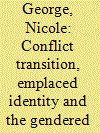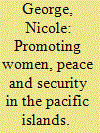|
|
|
Sort Order |
|
|
|
Items / Page
|
|
|
|
|
|
|
| Srl | Item |
| 1 |
ID:
175364


|
|
|
|
|
| Summary/Abstract |
Although there is growing recognition that women’s participation is critical for the durability of peaceful conflict transition, grounded research examining the political scale of women’s participation has not been common. Where feminist researchers have tackled this topic, they have generally reproduced binary representations of political space, sometimes strongly critical of local spaces as restrictive of women, sometimes strongly critical of a hegemonic liberal international. In this article, I address the issue of women’s participation in conflict transition governance from another more ethnographic angle, drawing from fieldwork conducted in the Solomon Islands, a Pacific Islands country destabilised by conflict in the late 1990s and early 2000s. I apply theories of political scale to consider where and how women are politically active in the conflict transition environment, how that political activity is constituted relative to other political scales and where and how women seek to make their political ambitions understood. The ‘emplacement’ lens I develop offers a critical vantage point for analysis of the ways women constitute political identities and the agendas they might meaningfully progress, at scales ranging from the small worlds of the household and the community to the broader scale of national politics.
|
|
|
|
|
|
|
|
|
|
|
|
|
|
|
|
| 2 |
ID:
175358


|
|
|
|
|
| Summary/Abstract |
This introduction provides an overview for the following collection of articles that engage with, and aim to extend, recent scholarship emphasising space as a category of analysis in peace and conflict studies. Attempts to ‘spatialise’ this field of enquiry have emphasised the ways actors and ideas travel and transform across scale (from the personal to the local, regional and global) and how agents, actors and identities constitute, and are constituted by, space and place in dynamics of conflict and peace. Attention to space has increased appreciation of the complex nature of nature of war- and peace-‘scapes’, and reflects upon space as material and symbolic, given meaning through peoples’ embodied activity and interactions. The articles in this issue engage with the foundations of the spatial turn and build upon innovations in spatial analysis of peace and conflict by focussing on the idea of ‘emplacement’ and emplaced security as critical to peacebuilding efforts and processes of conflict transition. To do so, we consider place in a relational sense, focussing on attachment, affective connection and narratives of place-identity as these are connected with conflict management, security, governance and political ordering.
|
|
|
|
|
|
|
|
|
|
|
|
|
|
|
|
| 3 |
ID:
165208


|
|
|
| 4 |
ID:
163263


|
|
|
|
|
| Summary/Abstract |
The ‘local turn’ in peacebuilding has been inspired by the idea that post-conflict order is made more just, representative and legitimate when there is greater recognition and incorporation of local sites of authority. However, the gendered visions of security that may be projected from these spheres have often escaped critical attention. This oversight continues despite growing feminist interest in understanding both the contributions that women can make to the durability of conflict settlement processes and the obstacles that often prevent those contributions from progressing. In this article, I examine the frictional encounters that occur between the local and the liberal in peacebuilding and focus particularly on what this means for women. I argue that a focus on vernacular security provides a productive analytical lens for answering this question and for building understanding of where and how women are advantaged and disadvantaged by projects of post-conflict transition. My findings demonstrate how the security vernaculars that are generated in liberal–local peacebuilding produce scenarios that are often contradictory for women and can be enabling and constraining in different contexts. The discussion draws from recent research findings on the gendered impacts of peacebuilding and post-conflict restoration in Bougainville, an autonomous territory of Papua New Guinea, and Solomon Islands.
|
|
|
|
|
|
|
|
|
|
|
|
|
|
|
|
| 5 |
ID:
130968


|
|
|
|
|
| Publication |
2014.
|
| Summary/Abstract |
How has the Women, Peace and Security agenda been advanced in the Pacific Islands? While some observers argue that this region suffers from a contagion of unrest, violence and state weakness, these estimates commonly ignore the vital work women have performed in the region as promoters of peace and security. Even when such activity places them in direct personal danger, women across the region have spearheaded efforts to bridge communal boundaries and challenge the increasing normalisation of violence, gendered and otherwise, that accompanies threatened or actual incidents of conflict. As this article demonstrates, these efforts have had profound impacts on the ground in conflict-affected Pacific Island countries. They have also received increased recognition at the level of institutional politics, with member states of the Pacific Islands Forum recently accepting a Regional Action Plan on Women, Peace and Security. This has been hailed as a significant achievement for the region's women peacebuilders. But much of this plan is focused on women's contributions to peacebuilding at the pointy end of a crisis. This overlooks the extent to which the 'slow violence' of environmental degradation, masculinised politics and militarism also compound gendered insecurity in the region. Attention to these issues offers a contradictory picture of the gains made in promoting the Women, Peace and Security agenda in the Pacific Islands. While this advocacy framework has provided important opportunities for the region's women peacebuilders, it may also have discouraged broader reflection on the prevailing structural conditions at work across the region which function in an attenuated fashion to undermine women's security and the achievement of a gendered regional peace.
|
|
|
|
|
|
|
|
|
|
|
|
|
|
|
|
|
|
|
|
|